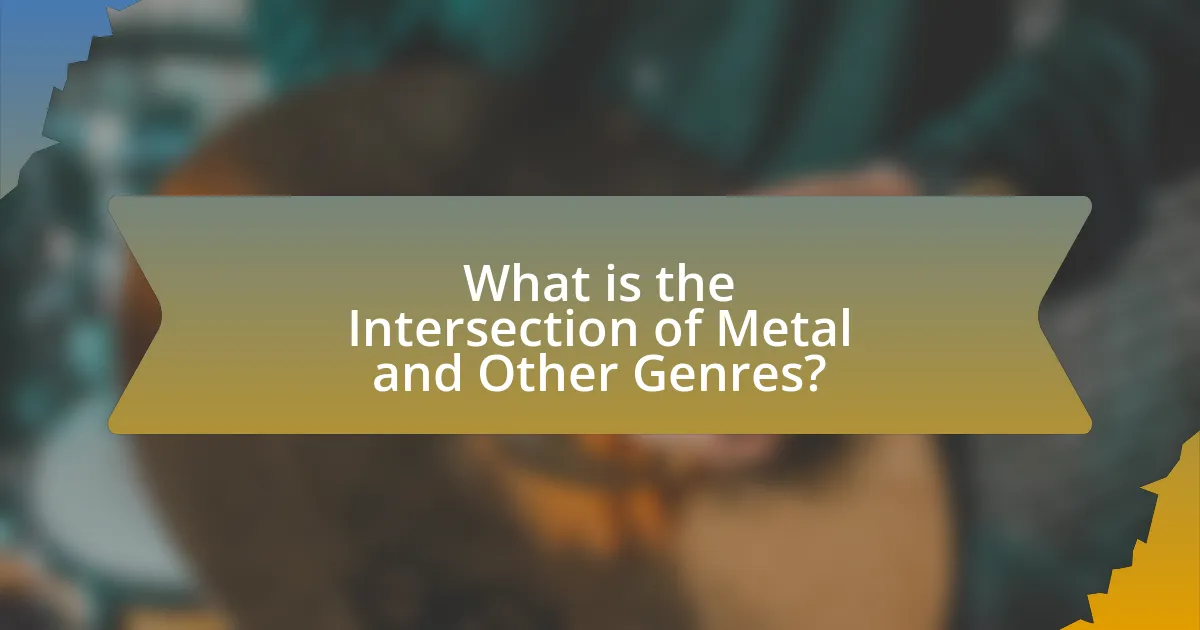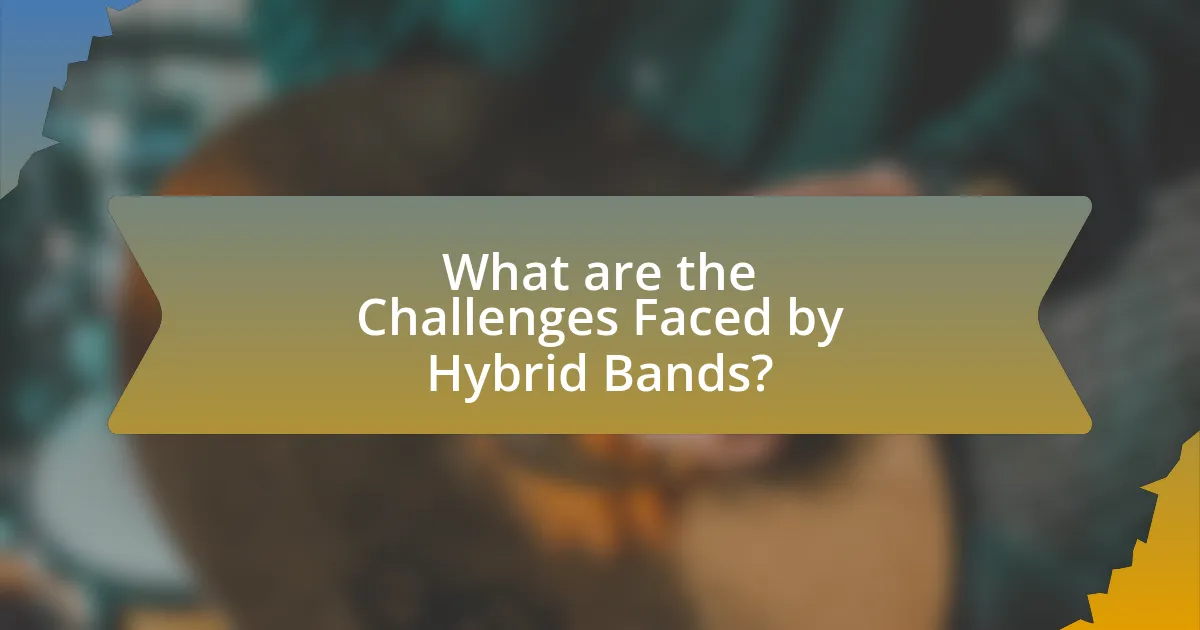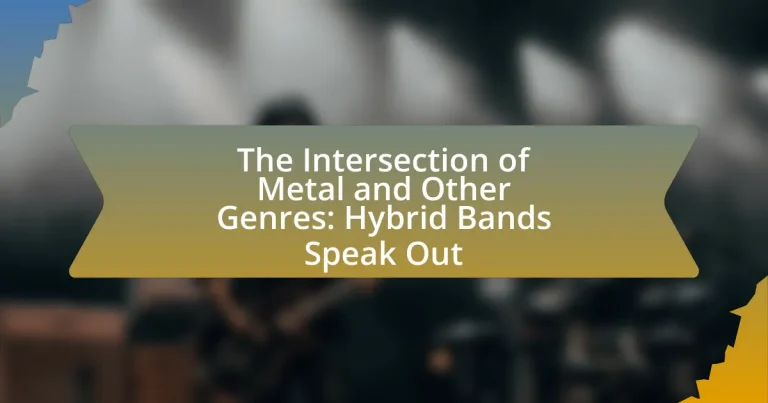The article examines the intersection of metal music with various genres, highlighting the emergence of hybrid bands that blend metal with styles such as punk, jazz, classical, and electronic. It discusses how this fusion creates new subgenres, enhances creativity, and broadens the audience for metal music. Key characteristics of metal that facilitate this hybridization include its aggressive sound, complex rhythms, and thematic depth. The article also addresses the challenges faced by hybrid bands, including genre classification, audience acceptance, and the pressures from traditional metal fans, while emphasizing the importance of marketing and label support in their development. Insights from hybrid bands reveal their experiences in navigating these complexities and maintaining their identity while experimenting with sound.

What is the Intersection of Metal and Other Genres?
The intersection of metal and other genres refers to the blending of metal music with various styles such as punk, jazz, classical, and electronic, creating hybrid subgenres. For example, metalcore combines elements of metal and hardcore punk, while symphonic metal incorporates orchestral arrangements and classical music influences. This fusion has led to the emergence of diverse bands like Nightwish, which integrates symphonic elements, and Meshuggah, known for their progressive and jazz influences. The evolution of these hybrid genres demonstrates metal’s adaptability and its ability to innovate by incorporating different musical elements, thereby expanding its audience and artistic expression.
How does the blending of metal with other genres occur?
The blending of metal with other genres occurs through the incorporation of diverse musical elements, instrumentation, and stylistic influences from genres such as jazz, classical, punk, and electronic music. This fusion is exemplified by bands like Metallica, which integrated orchestral arrangements in their album “S&M,” and the use of jazz rhythms in the works of artists like Cynic. Additionally, the emergence of subgenres such as metalcore and symphonic metal illustrates how metal adapts and evolves by merging with other musical styles, creating new soundscapes and expanding its audience.
What are the key characteristics of metal that influence hybridization?
The key characteristics of metal that influence hybridization include its aggressive sound, complex rhythms, and thematic depth. These elements allow metal to blend effectively with various genres, such as punk, jazz, and classical. The aggressive sound, characterized by distorted guitars and powerful vocals, creates a foundation that can merge with the raw energy of punk or the intricate arrangements of jazz. Complex rhythms, often featuring syncopation and polyrhythms, enable metal to adapt to diverse musical styles, enhancing its versatility. The thematic depth, which often explores existential and social issues, resonates with audiences across genres, facilitating collaborations and hybridization. These characteristics have been observed in numerous hybrid bands, demonstrating the adaptability and influence of metal in the broader music landscape.
How do different genres complement metal in hybrid bands?
Different genres complement metal in hybrid bands by introducing diverse musical elements, enhancing creativity and broadening the appeal of the music. For instance, the incorporation of jazz can add complex rhythms and improvisational solos, while elements of electronic music can introduce innovative soundscapes and production techniques. A notable example is the band “The Algorithm,” which blends metal with electronic music, resulting in a unique sound that attracts fans from both genres. Additionally, the fusion of metal with genres like hip-hop, as seen in the collaboration between bands like “Limp Bizkit,” creates a dynamic interplay of aggressive guitar riffs and rhythmic vocal delivery, appealing to a wider audience. This genre blending not only enriches the musical experience but also fosters a more inclusive community among fans of different styles.
Why is the intersection of metal and other genres significant?
The intersection of metal and other genres is significant because it fosters innovation and expands the musical landscape, allowing for diverse expressions and new subgenres. This blending creates unique sounds that attract a wider audience, as seen in bands like Linkin Park, which combines metal with hip-hop, or Nightwish, which merges metal with symphonic elements. Such collaborations not only challenge traditional genre boundaries but also enhance the emotional depth and complexity of the music, making it more relatable and accessible to various listeners.
What cultural impacts arise from genre blending in music?
Genre blending in music fosters cultural impacts such as increased diversity and cross-cultural collaboration. This phenomenon allows artists to merge different musical styles, leading to innovative sounds that reflect a broader range of cultural influences. For instance, the fusion of metal with genres like hip-hop or jazz has created unique subgenres, exemplified by bands like Rage Against the Machine, which combines rock with political rap, thereby reaching diverse audiences and promoting social messages. Additionally, genre blending encourages the breaking down of cultural barriers, as seen in the global popularity of K-Pop, which incorporates elements from various genres, thus appealing to a wide demographic and fostering a sense of global community.
How does this intersection challenge traditional music classifications?
The intersection of metal with other genres challenges traditional music classifications by blurring the lines between distinct musical styles, creating hybrid forms that defy conventional categorization. For instance, bands that incorporate elements of jazz, classical, or electronic music into their metal compositions demonstrate how these genre fusions can produce unique soundscapes that do not fit neatly into established categories. This phenomenon is evidenced by the rise of subgenres like metalcore and symphonic metal, which combine aggressive metal elements with melodic and orchestral influences, thereby expanding the definition of what metal can encompass. As a result, traditional music classifications struggle to accommodate these evolving styles, leading to a more fluid understanding of genre boundaries in contemporary music.
Who are some notable hybrid bands in the metal genre?
Notable hybrid bands in the metal genre include Metallica, which blends heavy metal with elements of rock and thrash, and System of a Down, known for their fusion of metal with Armenian folk music and alternative rock. Additionally, bands like Sepultura incorporate tribal rhythms and groove metal, while Linkin Park combines nu-metal with electronic and hip-hop influences. These bands exemplify the diverse intersections of metal with various musical styles, showcasing the genre’s adaptability and evolution.
What genres do these bands typically incorporate into their music?
These bands typically incorporate genres such as metalcore, progressive metal, and post-metal into their music. Metalcore blends elements of hardcore punk and heavy metal, characterized by breakdowns and melodic choruses, while progressive metal incorporates complex structures and time signatures, often drawing from jazz and classical influences. Post-metal emphasizes atmosphere and texture, often integrating elements from ambient and experimental music. This genre fusion allows bands to create diverse soundscapes that appeal to a wide range of listeners, showcasing the versatility and evolution of metal music.
How have these bands influenced the metal scene?
These bands have significantly influenced the metal scene by integrating diverse musical elements and expanding the genre’s boundaries. For instance, bands like Metallica and Linkin Park have blended metal with elements of punk, hip-hop, and electronic music, creating subgenres such as nu-metal and metalcore. This fusion has attracted a broader audience, evidenced by Linkin Park’s album “Hybrid Theory,” which sold over 10 million copies in the U.S. alone, showcasing the commercial viability of hybrid styles. Additionally, the incorporation of melodic and atmospheric elements by bands like Opeth and Nightwish has introduced progressive and symphonic influences, pushing the creative limits of metal and inspiring countless artists to explore new sonic territories.

What are the Challenges Faced by Hybrid Bands?
Hybrid bands face several challenges, including genre classification, audience acceptance, and creative constraints. The difficulty in defining their musical identity often leads to confusion among listeners and industry professionals, making it hard for these bands to find their niche. Additionally, audience acceptance can be a barrier, as fans of specific genres may resist the blending of styles, limiting the band’s reach and potential fanbase. Creative constraints arise from the need to appeal to diverse audiences while maintaining artistic integrity, which can lead to internal conflicts within the band regarding musical direction. These challenges are evident in the experiences shared by various hybrid bands, highlighting the complexities of navigating the music industry while merging different genres.
How do hybrid bands navigate genre expectations?
Hybrid bands navigate genre expectations by blending elements from multiple musical styles, allowing them to create a unique sound that defies traditional categorization. This approach enables them to appeal to diverse audiences while challenging the constraints of specific genres. For instance, bands like Linkin Park and Bring Me The Horizon incorporate elements of rock, metal, hip-hop, and electronic music, which broadens their listener base and fosters innovation. By experimenting with various musical techniques and collaborating with artists from different genres, hybrid bands effectively redefine genre boundaries and encourage a more inclusive musical landscape.
What pressures do they face from traditional metal fans?
Hybrid bands face significant pressures from traditional metal fans, primarily regarding authenticity and adherence to genre conventions. Traditional metal fans often expect bands to maintain the classic sound and themes associated with metal, which can lead to criticism when hybrid bands incorporate elements from other genres. This pressure is evident in the backlash that some bands receive for experimenting with styles like pop, electronic, or even hip-hop, as traditionalists may perceive these changes as a dilution of the metal identity. For instance, bands like Metallica faced scrutiny during their transition to a more mainstream sound in the 1990s, illustrating the challenges hybrid bands encounter in balancing innovation with the expectations of a loyal fanbase.
How do they maintain their identity while experimenting with sound?
Hybrid bands maintain their identity while experimenting with sound by integrating core elements of their original genre, such as distinctive riffs, lyrical themes, and vocal styles, into new musical explorations. For instance, many metal bands incorporate diverse influences like jazz or electronic music while ensuring that their signature heavy guitar sound and aggressive vocals remain prominent. This approach allows them to innovate without losing the essence that defines their musical identity, as seen in bands like Metallica, which has successfully blended orchestral elements into their music while retaining their heavy metal roots.
What obstacles do hybrid bands encounter in the music industry?
Hybrid bands encounter significant obstacles in the music industry, primarily due to genre classification challenges. These bands often struggle with being pigeonholed into specific genres, which can limit their marketability and audience reach. For instance, a study by the International Federation of the Phonographic Industry (IFPI) highlights that genre-specific marketing strategies can hinder the promotion of hybrid music, as traditional labels may not know how to effectively market a blend of styles. Additionally, hybrid bands frequently face difficulties in securing performance opportunities, as venues and promoters may prefer to book acts that fit neatly into established genres. This can lead to reduced visibility and fewer chances to connect with potential fans.
How does marketing affect the success of hybrid bands?
Marketing significantly influences the success of hybrid bands by enhancing their visibility and audience reach. Effective marketing strategies, such as targeted social media campaigns and collaborations with influencers, can attract diverse fan bases that appreciate the fusion of genres. For instance, hybrid bands like Bring Me The Horizon have successfully utilized digital marketing to engage with fans, resulting in increased streaming numbers and concert attendance. According to a 2021 report by the International Federation of the Phonographic Industry, artists who actively engage in marketing efforts see a 30% higher growth in their listener base compared to those who do not. This demonstrates that strategic marketing is crucial for hybrid bands to thrive in a competitive music landscape.
What role does label support play in their development?
Label support plays a crucial role in the development of hybrid bands by providing financial resources, marketing strategies, and industry connections. This support enables these bands to produce high-quality recordings, reach wider audiences, and collaborate with other artists, which is essential for their growth in a competitive music landscape. For instance, labels often facilitate promotional campaigns that highlight the unique blend of genres these bands represent, thereby enhancing their visibility and appeal.

What Insights Can Hybrid Bands Share About Their Experiences?
Hybrid bands can share insights about their experiences in blending metal with other genres, highlighting the creative freedom and challenges they encounter. These bands often report that merging diverse musical styles allows for innovative soundscapes, attracting a broader audience. For instance, bands like Linkin Park and Bring Me The Horizon have successfully integrated elements of electronic, pop, and hip-hop into their metal foundation, resulting in commercially successful albums. Additionally, hybrid bands frequently discuss the difficulty of maintaining authenticity while appealing to fans of multiple genres, as seen in the mixed reception of their experimental works. This duality of artistic expression and audience expectation provides a rich perspective on the evolving landscape of music.
What lessons have hybrid bands learned from their genre-blending journeys?
Hybrid bands have learned the importance of adaptability and innovation from their genre-blending journeys. By merging different musical styles, these bands have discovered that embracing diverse influences can lead to unique soundscapes that resonate with a broader audience. For instance, bands like Linkin Park successfully combined elements of rock, hip-hop, and electronic music, which not only expanded their fan base but also influenced the evolution of nu-metal as a genre. This adaptability has proven essential in navigating the rapidly changing music industry, where audience preferences shift frequently. Additionally, hybrid bands have recognized the value of collaboration, often working with artists from various genres to enhance their creative output and reach new listeners.
How do they approach songwriting in a hybrid context?
Hybrid bands approach songwriting by blending elements from multiple genres, allowing for a diverse range of musical influences and styles. This method often involves integrating metal with genres such as jazz, electronic, or folk, creating unique soundscapes that reflect the band’s varied musical backgrounds. For instance, bands like Between the Buried and Me utilize progressive structures and intricate melodies, while incorporating elements from rock and jazz, demonstrating the effectiveness of genre fusion in songwriting. This approach not only broadens their creative palette but also attracts a wider audience, as evidenced by the growing popularity of hybrid genres in contemporary music.
What advice do they have for aspiring hybrid musicians?
Aspiring hybrid musicians should focus on developing a unique sound that blends elements from different genres while maintaining authenticity. This approach allows musicians to stand out in a crowded market, as evidenced by successful hybrid bands that have gained popularity by merging styles like metal with pop, jazz, or electronic music. Additionally, they should invest time in mastering their instruments and understanding music theory, which enhances their ability to innovate and create complex compositions. Engaging with diverse musical influences and collaborating with artists from various genres can also provide fresh perspectives and inspire creativity.
How can fans support hybrid bands in the music scene?
Fans can support hybrid bands in the music scene by actively attending their live performances and purchasing their music. Attendance at concerts not only boosts the band’s visibility but also contributes to their revenue, which is crucial for their sustainability. Additionally, buying albums or streaming their music on platforms that fairly compensate artists helps ensure that hybrid bands can continue to create and innovate within their genres. According to a 2021 report by the Music Industry Association, live music and direct sales account for over 70% of independent artists’ income, highlighting the importance of fan engagement in supporting these unique musical acts.
What actions can fans take to promote genre diversity in music?
Fans can promote genre diversity in music by actively exploring and sharing music from various genres. This includes attending concerts and festivals that feature a mix of genres, which helps to support artists who blend styles and encourages venues to book diverse acts. Additionally, fans can create and share playlists that include a variety of genres, showcasing their favorites and introducing others to new sounds. Engaging in discussions on social media about genre diversity and advocating for inclusive playlists on streaming platforms can further amplify diverse musical voices. Research indicates that exposure to a wider range of musical styles can enhance listeners’ appreciation and understanding of different genres, fostering a more inclusive music culture.
How can fans engage with hybrid bands on social media?
Fans can engage with hybrid bands on social media by actively participating in discussions, sharing content, and attending virtual events. Engaging in discussions allows fans to express their opinions on the band’s music and genre fusion, fostering a sense of community. Sharing content, such as music videos or concert footage, helps promote the band and increases visibility. Additionally, attending virtual events like live streams or Q&A sessions provides fans with direct interaction opportunities, enhancing their connection with the band. These methods are effective as they leverage social media’s interactive nature, which is crucial for building relationships between artists and their audience.


